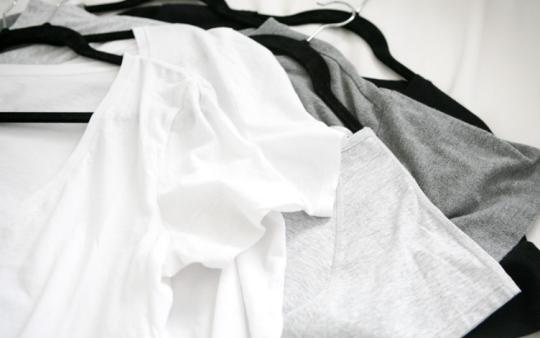Let's be honest for a moment: we are a society obsessed with clean. We are careful to bathe, deodorize, rinse, trim, shave, scrub, loofah, lotion, and spritz. This isn't a bad thing. Smelling clean, looking clean, and actually being clean are great things. Especially if I'm standing next to you on a packed elevator. Really. Thank you for showering.
Sometimes though, in our quest for cleanliness, we take a big leap over that line between clean and hermetically sealed. All those antibacterial products; those offensive disinfectant wipes. Sure, we've trashed those in favour of non-toxic cleansers, and you know what? Our bodies, endocrine systems, and lungs thank us! We are embracing those good germs! Yay us! But even though we're using green laundry detergents and wool dryer balls, we're still making a big green mistake: we are guilty of overcleaning our clothes.
Why dirty is the new clean
Okay, maybe that's overstating it a bit. You don't have to go around in filthy, stained clothing being all smelly and hobo chic. But there is something to be said about our national pastime of laundry and the huge amount of water consumption that goes into keeping our clothing clean. Just because we have washing machines and dryers that make doing laundry a breeze, doesn't mean that those appliances should be seeing as much action as they are.
Making it a point to really consider how often our clothing actually needs to be washed is one more step toward a greener lifestyle. It's time to get serious about water conservancy (David Suzuki would be so proud of me right now!).
...because we're wasting too much water
We're pretty lucky to live in a country where there's lots and LOTS of water. I know I'm guilty of using way more than our family needs. Sometimes I'll just zone out while I'm brushing my teeth, water madly rushing down the drain, and I won't even think about the implications. Not really. But we need to take care of the water we have. Water is special, and the amount of work that goes into making it clean and potable for human consumption is immense. And yet, for most of us, we don't consider how our water gets to us. It's just there. We also don't really think about where our water goes once it's down the drain. It's just gone. The soaps, detergents, chemicals, and even foods and waste that we pour down or drains or flush down our toilets have to go somewhere. And that somewhere is back into our waterways, which is a horrific thought.
If that isn't enough to make you consider being more thoughtful about the water we use, consider water waste from a cost perspective: water bills aren't cheap. But it doesn't have to be that way. There's a way to make them cheaper and get a fancy green eco badge at the same time: wash your clothes less!
Think about it this way: the average high efficiency washer uses anywhere from 15-30 gallons for one load. A regular efficiency washer uses anywhere from 29-45 gallons. If a family of four does eight loads a week (which is pretty conservative), they will have used anywhere from 120 gallons to 360 gallons of water in one week! And that's just laundry!! I think we can do better than that!
A great way to make a big impact with one small change is to be more conscious of how much laundry you are doing. It'll save you money on your water bills, take some pressure off the eco system, and extend the life of your clothes: not bad, right?!

How often do clothes actually need to be washed?
Now, this list isn't exhaustive but it's meant to be a guideline of how often clothes should be cleaned. It doesn't take into consideration spills, messes, or dirt, rather, time spent against the body. An item is definitely banished to the laundry pile if it's been exposed to fluids. Yup, I just said it: fluids. Did you sweat in it? Get blood on it? Baby drool? Apple Juice? Then please happily toss it in the hamper.
Did you wear it for an hour and it went completely untouched by fluids? Then it can live to tell another story before being thrown in the laundry.
Wash after every wear:
- underwear
- socks
- tshirts, tanks
See a trend here?? If it sits against your body all day then it will need to be washed. Bodies sweat (fluids). Sweat not only stinks and stains clothing, but sweat can also be a hot spot for bacteria. Which is so not fashion forward.
Wash every 2-3 wears:
- bras
- pjs
Even though both bras and pjs are up against your skin, they both get a little leeway time. But keep in mind, if you sweat in those warm, cozy jammies, they have to go to the wash too!
Items that can go the distance:
- jeans
- suits
- sweaters
- outerwear
Of course, this doesn't mean that these tough members of your closet should never see the inside of your washer's tub, but these items can take a beating and be worn many times before you begin to feel like laundering is necessary (although chances are you'll eventually get a blob of ketchup on your knee or dribbly coffee on your sweater and the clothes will make their way to the laundry anyway).
Embracing a new perspective on your home's laundry activities benefits everyone. Your washer is probably overworked and could use a break. Your water bill will thank you. So will those wetlands! The life of your clothing will be extended and you'll spend less time folding and ironing. When dirty is the new clean, everyone wins!









